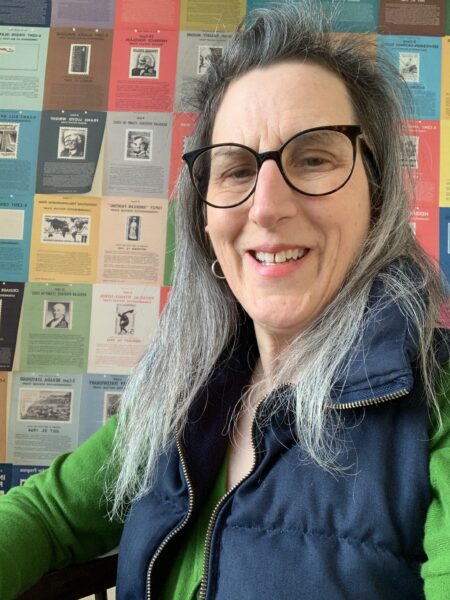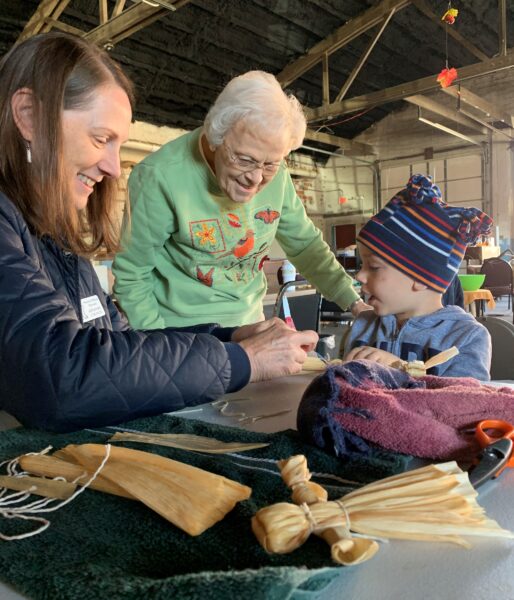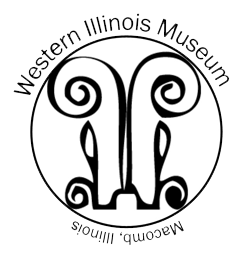Q&A with Sue Scott, director, Western Illinois Museum
The Project…
General Operating Support
Location: Macomb, Illinois
Western Illinois Museum received funds in November 2022 to support the organization’s operations.
The Organization…
Founded in 1974, the Western Illinois Museum’s mission is to “nurture our history and culture.” The Museum grew from a one-floor space, campus museum created and run by dedicated students to a full-fledged Museum in its own space, housing well over 6,000 historic artifacts from the region. The Museum has become a hub of community activity. Learn more about the Western Illinois Museum and help support its “Renovate to Innovate” capital campaign to make the east side of the building fully functional.
Follow @wimuseum: Website | Facebook | Instagram | Twitter | YouTube | Attend an Event
Featured Image: Western Illinois University Fraternity, Delta Upsilon, helping move the collection in preparation for renovation work.
The Q&A…
Q: How do you see the arts/culture/humanities as being essential?

Sue Scott: The Arts and Humanities, at this time of my life, seem like a heavy toolbox, the kind you find in an old garage full of tools. Often you don’t even know what they are used for. Yet without those tools, you can’t build something new or fix something that needs repair. Maybe you are lucky enough to know someone who has just the right tool to make a job easier and who generously teaches you how to use it. The humanities and arts can do that. They build an understanding of the world around us and even offer us what we need to rethink and create a more meaningful, equitable, and connected place to live and thrive.
Q: What is the most important thing people should know about your work?
Sue Scott: After nearly 15 years in Macomb, I have seen qualities of rural America that are often misunderstood –even within the community. At the Museum, it’s intentional that we don’t often focus on the exceptional or famous person from our town but find we can address the need to shift the perception that our lives are just defined by a series of well-established milestones, graduation, marriage, family, etc. At the Museum we look for connections with history and other to help our audience to see how their actions, decisions, and relationships- impact others and shape our community. By looking at the everyday lives of others, we can show that their lives, too, have value and a nuanced meaning, even if they are not in a history book.
Q: How did you arrive at doing what you do?
Sue Scott: I grew up in a family that visited museums and historic sites. Being curious and asking questions were encouraged in our household. I wanted to be an artist from a young age and my dad told me that artists had to observe and notice details. This encouragement serves me well in my creative work, as well as running an art gallery, and now a small regional Museum. I see the Museum as belonging to our community. Curiosity has served me in learning what I can from the people who have lived here for generations and those who choose to make it their home. I need to be a keen observer to document and collect what I hope will represent this place at this time.
Q: Who makes your work possible?
Sue Scott: There is a web of people that makes it possible for the Museum to carry out its mission and live its values. The groundswell of support that the community offers for programs and exhibits is key to keeping the doors open. We think the building needs to be full of people, interacting, talking, laughing, and learning to be relevant. Our volunteers are our biggest advocates and offer the support needed to help us further our mission. Financially, we have many individual donors who give at all levels. This participation and diverse sources of revenue allow us to take an innovative approach to present the arts and humanities as well as make it much more fun.

Sue Scott’s Suggested Readings List:
I read Priya Parker’s book, “The Art of Gathering” during the pandemic and it reshaped the way I approach programming. I find myself coming back to it again and again especially when I am not sure how to move forward with a new initiative or when a program series needs to be recrafted.
Another book that I keep coming back to is “Unreasonable Hospitality” by Will Guidara. It is about running a fine dining establishment and might seem unrelated to Museum work. I found it shifted how I approach creating a connection with our visitors, and, more importantly, how to empower staff and volunteers to carry out that work.
Note: Sue Scott was honored with a Public Humanities Award by Illinois Humanities in 2022.
About The Illinois Humanities Grantee Partner Spotlight
Illinois Humanities highlights the work of our Community Grants program partners through our “Grantee Spotlight.” It shines the light on our grantee partner’s work, offering details about the organization and the funded project, as well as a Q&A with a team member at the organization. More: ILHumanities.org/Spotlight
About Illinois Humanities
Illinois Humanities, the Illinois affiliate of the National Endowment for the Humanities, is a statewide nonprofit organization that activates the humanities through free public programs, grants, and educational opportunities that foster reflection, spark conversation, build community and strengthen civic engagement. We provide free, high-quality humanities experiences throughout Illinois, particularly for communities of color, individuals living on low incomes, counties and towns in rural areas, small arts and cultural organizations, and communities highly impacted by mass incarceration. Founded in 1974, Illinois Humanities is supported by state, federal, and private funds.
Learn more at ilhumanities.org and on Facebook, Twitter, Instagram, and LinkedIn @ILHumanities.
